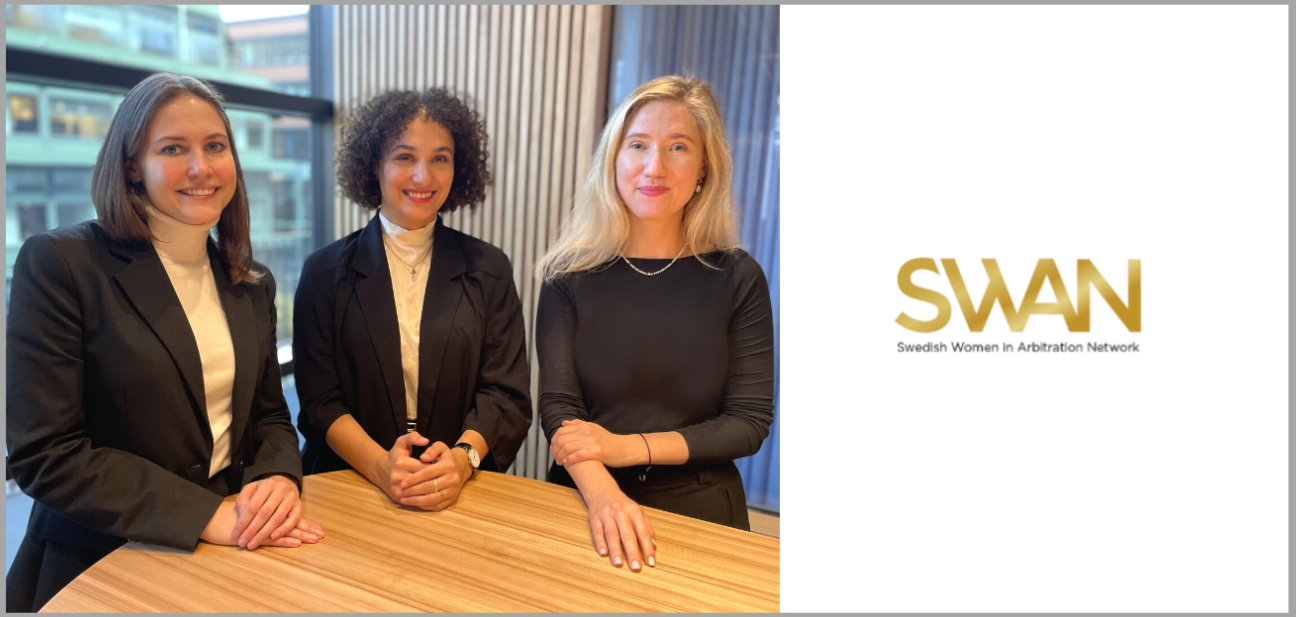SWAN and the mission to close the gender gap in the arbitration community
An interview with Anina Liebkind, Mikaela Lamrin, and Raffaela Isepponi, who are newly appointed board members of SWAN – Swedish Women in Arbitration Network.
Published 2023-01-26

SWAN - Swedish Women in Arbitration Network - is a network for women with an interest in arbitration.
What would you say are the strengths of a network such as SWAN?
Mikaela Lamrin: I would say that the strength of SWAN is that it is more of an informal network where you meet colleagues over a lunch or at an evening event. What I appreciate the most is its open atmosphere and that it serves as a meeting point where you can discuss legal questions and exchange experience regarding different career paths.
As a young female arbitrator, how do you feel that you make a difference?
Anina Liebkind: I’m used to carefully considering facts and ideas that others may not think about or may think are an established truth. This brings added value to the tribunal and the quality of the award. I think it’s important to show the next generation in concrete terms that the possibility of a future in arbitration is real regardless of gender or any other diversities. It’s OK to stand out and do things in a way that is true to yourself. I hope that I can, through my work, contribute to moving the dial forward on that point.
Raffaela, you have previously worked in Switzerland and in Asia. When comparing Sweden to other regions, can you see any differences when looking at representation in arbitration?
Raffaela Isepponi: Sweden has come a long way when it comes to the topic of gender equality. But at the same time, I see cases in which both parties are represented by male counsel who each appoint a male wing arbitrator who in turn appoint a male chairperson. These are the moments when I realize that there is still a long way to go to bridge the gender gap. In many of these cases, it comes down to knowledge gaps, habitual ways of working or unconscious biases. But there is a significant number of exceptional women in the arbitration community with not just potential but also a proven track record. There are no more excuses as to why a large group of the skilled professionals should not be appointed as arbitrators or promoted to partners. The glass ceiling still exists, and this is the reason why it is essential to keep this discussion open.
Looking back, is there anything that you wished someone would have told you at the beginning of your career in arbitration?
Mikaela: Well, one of my first cases was an international arbitration case. And international arbitration was something that I hadn’t read a lot about during my studies at the university. In this case, Swedish law was the applicable law, but the arbitral tribunal consisted of two non-Swedish arbitrators and only the chairman was Swedish. After this case I realized that, when an arbitral tribunal is composed of mixed nationalities, it is important to remember that not all of them will be familiar with Swedish law. Therefore, it is essential to be careful with the details, and not to make any assumptions that the arbitrators have extensive knowledge of Swedish law.
What steps are you taking to contribute to the work of closing the gender gap?
Raffaela: I can take the example of the appointment process at the SCC. Before the SCC Board makes the appointments, the Secretariat presents its suggestions. As I mentioned before, we are all unconsciously biased and I think this is one of the most important things to be aware of, and to be able to actively question or justify the decisions. I try to break with old thought patterns, and not just when it comes to gender. I strive to embrace diversity and also to get in younger people, and I am convinced a broader representation is possible to achieve without compromising on the requested expertise in the cases. Studies show that companies that rank high in gender diversity outperform their peers. At the end of the day, we want the best result for our users, and I believe this is achieved by including all talent.
About the new SWAN board members: (left to right on the picture)
Mikaela Lamrin is Senior Associate at Lindskog Malmström, Raffaela Isepponi is Legal Counsel at the SCC, and Anina Liebkind is a Partner at Norburg & Scherp.
To SWAN website